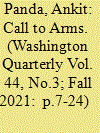| Srl | Item |
| 1 |
ID:
181340


|
|
|
|
|
| Summary/Abstract |
Having declared his nuclear deterrent “complete” following the testing of three intercontinental-range ballistic missiles (ICBMs) and a thermonuclear device in 2017, North Korean leader Kim Jong Un has been overseeing a period of qualitative nuclear modernization and quantitative force expansion. North Korea’s nuclear forces continued to grow during the short-lived period of diplomacy with South Korea and the United States in 2018 and 2019. In January 2021, in reviewing the accomplishments of the five-year period following North Korea’s Seventh Party Congress in 2016, Kim alluded to “tactical nuclear weapons” among other significant accomplishments concerning his nuclear forces during that era. This was a notable statement. Traditionally, North Korea has referred to its nuclear capabilities euphemistically as “strategic” weapons. When references to tactical nuclear weapons (TNW) would appear in state media, they would reference US nuclear capabilities; North Korea has never acknowledged that the United States withdrew its last nuclear weapons from the Korean Peninsula in December 1991.
|
|
|
|
|
|
|
|
|
|
|
|
|
|
|
|
| 2 |
ID:
149614


|
|
|
|
|
| Summary/Abstract |
In this article, the authors conduct a comparative review of the strategic imperatives driving Sino-Indian policy on Afghanistan in the post-2014 scenario. The article argues that divergent strategic imperatives make cooperation difficult and/or unlikely. This analysis is based on a broader consideration of both contemporary history and geopolitical dynamics shaping the foreign policy considerations of these two countries, and an assessment of the impact of ongoing bi-lateral and regional aspirations. The authors begin by highlighting the salient dynamics that have historically characterized and driven Indian and Chinese foreign policy in general and on Afghanistan. They find that Afghanistan, although not a primary focus of either state’s foreign or security policy, historically, is increasing in importance for both; India and China compete on a range of economic and security issues.
|
|
|
|
|
|
|
|
|
|
|
|
|
|
|
|
| 3 |
ID:
156279


|
|
|